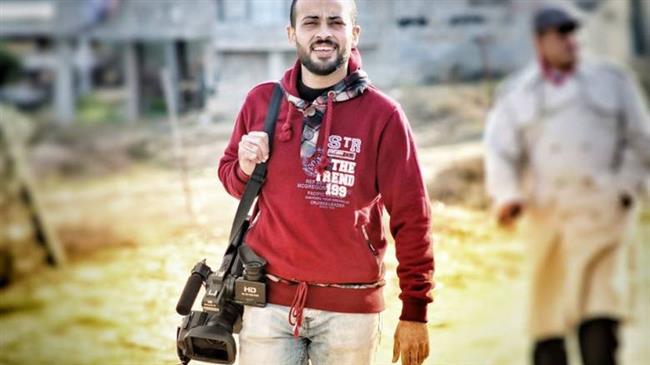
RNA - The spokesman for the Gaza Ministry of Health, Ashraf al-Qidra, said in a statement that 24-year-old Palestinian journalist Ahmed Abu Hussein sustained grave gunshot wounds east of Jabalia, located 4 kilometers (2.5 miles) north of Gaza City, on April 13.
He was initially transferred to a hospital in the central West Bank city of Ramallah, located 10 kilometers (6 miles) north of Jerusalem al-Quds, and then a medical center in Jerusalem al-Quds, where doctors could not save his life.
Abu Hussein worked for Gaza’s al-Shaab radio station and wore a protective vest marked “PRESS” at the anti-Israel protest. He is the second journalist killed by Israeli army gunfire at Gaza protests.
Yasser Murtaja , 30, a cameraman for Palestinian Ain Media, was shot on April 6 and died the next day.
Protests along the Gaza border since March 30 have led to clashes with Israeli forces in which at least 38 Palestinians have lost their lives and hundreds of others sustained injuries.
The Palestinian rally, dubbed the "Great March of Return," will last until May 15, which coincides with the 70th anniversary of Nakba Day (Day of Catastrophe) on which Israel was created.
Every year on May 15, Palestinians all over the world hold demonstrations to commemorate Nakba Day, which marks the anniversary of the forcible eviction of hundreds of thousands of Palestinians from their homeland by Israelis in 1948.
More than 760,000 Palestinians - now estimated to number nearly five million with their descendants - were driven out of their homes on May 14, 1948.
Since 1948, the Israeli regime has denied Palestinian refugees the right to return, despite UN resolutions and international law that upholds people’s right to return to their homelands.
According to Press TV, this year's Land Day demonstrations appear especially combustible as Palestinian anger is already high over Trump's decision in December 2017 to recognize Jerusalem al-Quds as Israel's "capital."
Israel occupied the West Bank, East Jerusalem al-Quds and parts of Syria’s Golan Heights during the Six-Day War in 1967. It later annexed East Jerusalem al-Quds in a move not recognized by the international community.
Israel is required to withdraw from all the territories seized in the war under UN Security Council Resolution 242, adopted months after the Six-Day War, in November 1967, but the Tel Aviv regime has defied that piece of international law ever since.
847/940